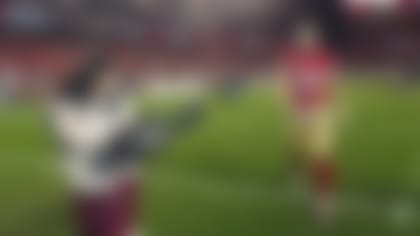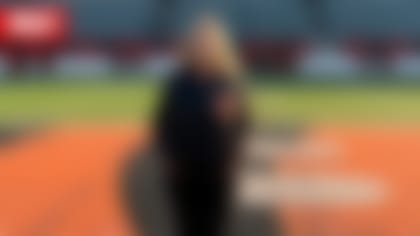Women are rising up the ranks throughout professional football, earning positions of power in a space that for too long was ruled almost exclusively by men. We're seeing more and more women breaking barriers in the sport, but what are the stories beyond the headlines? Who are the women shaping and influencing the ߣĎČÉúAV today? Answering those questions is the aim of the Next Woman Up series. While the conversational Q&As are edited and condensed for clarity, this is a forum for impactful women to share experiences in their own words. Without further ado, we introduce:
Sarina Soriano, San Francisco 49ers
Position: Senior Producer
How did you get your start in cinematography and sports?
Ever since I can remember, I have played soccer, so I was always obsessed with sports. It wasn't until around high school, though, where I really saw Michele Tafoya on my screen, and I was like, "Oh my gosh, this is so awesome. A Latina reporter on the big field for my favorite team." I watched the 49ers every Sunday with my family. I thought: That's something that I want to do. I think I really can because I'm seeing her on my screen. So, come college, I actually got my degree in broadcast journalism. I thought I wanted to be a reporter, but through the classes that I took in editing and filming, I also knew in the back of my head that I absolutely love cameras. It's funny looking back in high school as well, because I always had a camera in my hand, and I actually would film my cousins and my brothers, and we would make, like, music videos and just do all types of crazy stuff with the cameras to entertain my friends and family. Cameras have always been a huge part of my life.
Once I graduated from Caldwell University, the San Francisco 49ers actually posted a job that was specifically for women who had just graduated. It was a fellowship called the , where they were going to put women in six departments where we were underrepresented. So, I applied in the spring of 2016, and to my surprise and delight, they hired me. It was an absolute dream come true. I was in premium sales, finance and business analytics, but I knew in my heart that I could not wait to be placed with 49ers Studios. And that's when they first gave me my first cinema camera and really taught me all the ins and outs of studio filming, as well as ߣĎČÉúAV coverage during practice and games. Once that shift ended in my fellowship, I just knew that's where I wanted to be. I had hoped they would hire me full-time at the end of the fellowship. And lucky me, after a year, the fellowship ended, and I was hired as an associate producer.
This is my eighth season with the team, and I'm absolutely loving it. I am in charge of English and Spanish content, and it's literally a dream come true. My family is die-hard Niners fans, so I feel like I am exactly where I am supposed to be.
You started with the Niners right out of college and have grown with them. What have you learned in those eight years?
Honestly, the Denise DeBartolo York Fellowship provided such an interesting perspective in the business as a whole. I felt that I really got to talk with all the directors of each silo in the organization and truly understand what everyone did to make this football team look good. It was a really cool perspective. I feel being here eight years, I have grown so much as a leader and as a creator, specifically for my team, on my marketing department and throughout the organization. I don't think many people have had this kind of opportunity, being in the team for this many years, so it's been awesome.
It's been so cool seeing the team grow, as well. You really feel integrated into each team each season. It's awesome being with guys like Fred Warner and George Kittle, seeing them grow into the leaders they are today and getting to work with them on a video level. In a way, it's like, I grew up with those guys, too. Here we are, leaders in our own sections of the team, so it's super awesome.

What does a regular week during the season look like for you? And what does game day look like?
There's nothing like being in regular season. I'll start with the game day. My team and I -- we arrive five hours early to the stadium before kickoff. We're mic'ing up the pads for the players who are Mic’d Up that game. We're setting up GoPros in our radio booths. We're getting all of our camera gear ready to go. Each one of us has an assignment. We're filming our players arriving to the stadium, and we're putting out edits. We then film optional dynamic warmups and pregame -- and getting out all those edits -- and, finally, the best part of the day is filming highlights of the game itself, all our fans and the atmosphere. I would say we wrap up our day around two hours after the game has actually ended, because we have to film pressers and postgame content.
Once we have all of this footage -- that's four or five people shooting for most of the game, so it's hours and hours of footage -- we spend Monday logging. We're trying to see the bigger picture and what story we can tell in our 49 Hours series of game recaps, probably our biggest flagship series we have in the marketing department, but we have various other video series that we put out throughout the week. I would say it's a little bit like a Groundhog Day. We know exactly when each video needs to go out each week, and then sprinkle those in with some community relation events, pressers and maybe some other off-shoots that come up from our PR team or with our players. We're constantly moving, constantly going, but at the end of the day, we all really care about our art and telling the story of the team to our fans.
Who are you mainly working with?
So we have a web team, social team, we have our reporter , myself and 49ers Studios. On game days, we're working a lot with just our teams. However, everything that we do connects. Every part of the marketing department. So, if I'm putting out 49 Hours on a Wednesday, web needs to know what time that publishes. YouTube needs to know, and we're making images for our social team to help promote the piece. So, we all do very different things, however, everything that we do is very cohesive in regards to putting out the best content at the best time in the best light for our fans to enjoy.
You are the first female senior producer for the 49ers. What challenges have you faced?
Early on in my career, I think the biggest challenge for me was probably -- and I still deal with it a lot today, though -- is imposter syndrome. I'm a 5-foot-3 Latina from East Side San Jose, California, and here I am in this giant stadium with creators and people who don't really look like me. So to me, I felt I really had to be twice as excellent, if that makes sense. I felt that I had to really prove myself that, "Hey, I can do this, too. I belong here as well." And it's so cool to see the shift of women in marketing in general, but also as reporters, as photographers, and to see women really looking out for each other on social media. I really think that's why representation is so important. You see someone who looks like you, and you're like, "That's definitely something that I can accomplish. If they can do it, I can, too." I just hope that when people hear my story, that's exactly how they feel. It doesn't matter where you come from; if you have a goal and a dream, you got to stick to that.
I think, too, just the physical challenge of it all. We are constantly on the move. Physically, I have a 30-to-35-pound camera on my shoulder that I rock all game day, and I'm flying to away games, sometimes on the East Coast, on Fridays for game day. That same night after a game, we're flying back home, and on Monday, I have to be able to turn on my creativity. I think that's so hard, just as a creative in general, where you want to create so many things, but you're physically and mentally exhausted. It's super hard as a creative to always be on. So that's definitely one of my biggest challenges today as a leader is trying to continue to express myself through my art -- even on the days where you work a whole game day.

You've created so much content and won , which is huge. But what would you say is the most fulfilling part of your job?
Obviously, that means so much. I actually had been nominated before, but it wasn't until this year that my team and I -- we finally earned our first Emmys. That's so special. We won one in the Sports Program-Live/Post-Produced category for 49 Hours. The second Emmy I won was an individual one in the editor category for Spanish, so I was going up against Telemundo and a lot of other talented male editors. It was so cool to see my name in that group, and to actually win was insane.
But I think the most fulfilling thing is, honestly, our fan reactions after we post a passion project. One of my passion projects that I posted during Latino Heritage Month was our . It showed influencers, players and people throughout our community, including a woman who braids hair and my grandma, who was making her gorditas with flour. Being able to put people who look like me in projects is so important, and once we posted that, there were so many people who resonated with the video. They were like, "Thank you for thinking of us," and "We are huge fans of the team," and "This is so cool to show my little girls all these women in your videos." I just thought that was the coolest thing, and it really felt like a passion project to me.
The reaction we got to that video was awesome. We have a huge fan base in Mexico. We have so many of our fans who speak Spanish, and the campaign was completely in Spanish, so, people loved that.
The San Francisco 49ers call California home, and it would be a disservice to not put out that type of content. I want our art at the 49ers to represent everyone, all of the cultures that are fans of our team. So it's awesome when we get to do that.
Being born and raised in San Jose, what is it like working for the team you grew up rooting for?
It's so crazy. My family is so proud of me for doing what I set my intentions on. They're also proud that it was for the 49ers. My first job out of college. My family is actually here at every game, which is awesome, and I almost feel like those are the moments that are so special to me. When I look up at the stands, and I see my mom and dad, and it's like we're in this moment together. I think one of the most special memories I have is when we went to the Super Bowl in 2019. The Yorks were kind enough to fly out our family members and loved ones, so I was at the 2019 Super Bowl with my parents in the stands and my brother. And even though we lost, that moment of being like, "Wow, I'm standing on this field, one of the only women with a cinema camera on her shoulder getting to film my favorite team." I literally was tearing up on the sidelines a little bit. It's truly awesome getting to share this with my family.

Do you have any projects that are in the works?
A lot of my most special projects that I'm excited for are in the offseason, which is when we get to highlight our players off the field. So, our player features are when we get to visit their homes, talk to their families and maybe go to their high school and interview their high school coach or someone who's known them for most of their lives. Player features, with their helmet off, are my favorite projects.
That makes sense. It is much more personable -- you see more behind just the player on the field.
Yes, I really think people enjoy that type of content. One of my mantras I tell myself in that regard to my art is, "I want show the beauty and the resiliency of the human spirit." And I think sports is such a beautiful avenue to do that. Yes, they're amazing athletes on the field, but to also hear that your favorite athlete is an awesome human is like the cherry on top.
Do you have any mentors who guided you along the way? If so, how have they impacted you?
For me, my biggest influences have always been my family. My dad, who brought me into the 49er fandom, and my grandpa. My mom, who is a Latina in finance, she was paving her own way in an industry where there were not a lot of people who look like her. I think about my mama and papa, my grandparents, who came from Mexico and really were hoping for a better life for their family. They didn't really speak English, but they learned it. They became citizens, and now my whole family is here. What I'm doing -- sometimes I feel like -- is nothing compared to what my grandparents had to go through. One of my favorite quotes from professional tennis player Naomi Osaka goes something like, "I cannot lose when I remember my family. When I remember my ancestors, I know that I cannot lose." I truly resonate with that quote because she's absolutely right. No matter what I do in this life, if I do it with my heart and with passion, I know I've made my family proud. And that's what motivates me to be the best leader and creator that I can be.
You've talked about representation and the importance of it. What advice do you have for a young girl trying to break into the world of sports, whatever avenue it is?
My favorite piece of advice that I tell a lot of young women who are interested in sports is to never let the opinion of others deter you from your goals. You always have to find your inner compass and your why. Find a way. Make the most out of your situation. Network. Try to be the best you you can be, and the rest will fall into place.













